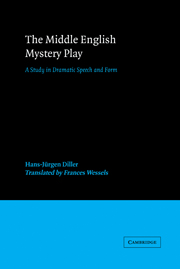Book contents
- Frontmatter
- Contents
- Preface
- Note on texts used
- Abbreviations and special symbols
- Introduction
- Part I The foil: Latin church drama
- Part II The English Creation to Doom cycle
- 5 The origins of the Creation to Doom cycle and its stage
- 6 The representation of time and space in the cycles
- 7 Address to the audience
- 8 Intra-dramatic speeches
- 9 Conclusions
- Notes
- Bibliography
- Indexes
9 - Conclusions
Published online by Cambridge University Press: 04 March 2010
- Frontmatter
- Contents
- Preface
- Note on texts used
- Abbreviations and special symbols
- Introduction
- Part I The foil: Latin church drama
- Part II The English Creation to Doom cycle
- 5 The origins of the Creation to Doom cycle and its stage
- 6 The representation of time and space in the cycles
- 7 Address to the audience
- 8 Intra-dramatic speeches
- 9 Conclusions
- Notes
- Bibliography
- Indexes
Summary
Inevitably, the factors investigated in this study differ in their relevance for the Corpus Christi play as a dramatic genre. We have seen, for instance, that the plays are quite capable of representing emotions, but they mostly do this by generalizing personal experience by way of the audience-address. It is only in a few, presumably late plays that we find direct expression of emotions, such as the non-cycle Abraham plays or Mary's Lament at the Cross in LC XXXII, 810ff (p. 300). Especially remarkable in this respect is the Joseph of the York Plays. While the Joseph of the Towneley Plays generalizes the plight of his supposed cuckoldom in an audience-address, his York counterpart breaks forth in a personal complaint which centres not on the fate of old men in general but on his specific, momentary calamity and which therefore does not depend on the audience as an addressee. The influence of school rhetoric, which is still more in evidence with characters like Abraham and Adam and Eve, is to be felt even here. The greater the literary and rhetorical ambition of the playwrights, the less are emotions represented by specifically dramatic means.
Even dialogue, which truly is the core of drama, hardly shows signs of continuous development. Truly dramatic dialogue, which makes the spoken word an instrument of interaction, is by and large the property of the two dramatists who stand out as clearly delineated personalities from the mass of anonymous writers: the York Realist and the Wakefield Master. A third playwright with a similar talent for dialogue may be identifiable in the author of the short octaves of the N–Town cycle.
- Type
- Chapter
- Information
- The Middle English Mystery PlayA Study in Dramatic Speech and Form, pp. 251 - 253Publisher: Cambridge University PressPrint publication year: 1992



